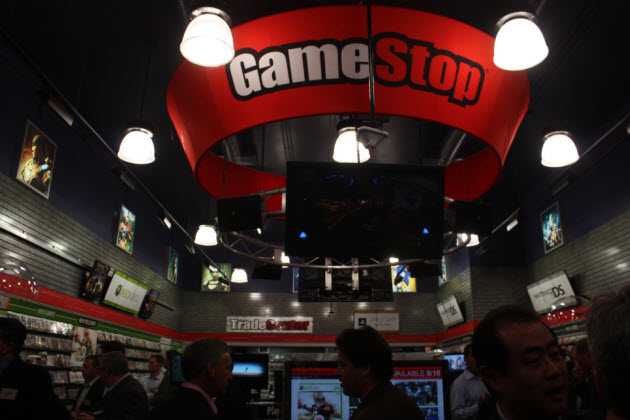
The top brass of GameStop, the world’s biggest video game store chain, dedicated their new “store of the future” on a cool strip of Palo Alto, Calif., tonight in the heart of Silicon Valley, where the assumption is that the dinosaur-like retail game chain is about to be “Netflixed.”
The new store is a model for how GameStop will marry online games with packaged goods. It has downloadable and Flash-based games on a web-connected PC. It has reward program kiosks, big displays for watching demos, and all sorts of other technology.
Seeking to avoid the fate of Hollywood Video, the video-rental business that shut more than 2,000 stores and laid off more than 19,000 employees, GameStop has bought Kongregate, an indie online game portal. And it also acquired Jolt Online Gaming, a maker of free-to-play online games. Raines said that GameStop has more than 500 million visitors a year to its stores and can steer that foot traffic to its web sites and online gaming solutions.
AI Weekly
The must-read newsletter for AI and Big Data industry written by Khari Johnson, Kyle Wiggers, and Seth Colaner.
Included with VentureBeat Insider and VentureBeat VIP memberships.
Tony Bartel (pictured, below), president of GameStop, showed me and Nintendo’s head of sales and marketing, Cammie Dunaway, how the kiosks work. You walk up to the big display and show your PowerUp Rewards Pro card to an optical scanner. Your name comes up on the screen and then displays the games you’ve bought. It also shows your wish list and allows you to add to it. You do so by grabbing a game from the racks and scanning its barcode. The game instantly pops up on the Interactive Game Guide kiosk display (below). You can share the information with your friends. And GameStop can give you more rewards and achievements the more you spend at the store.
Bartel said that early results show the PowerUp Rewards Pro is extremely popular with customers and that the kiosks are also a big draw. Dunaway asked how wide the demographic reach of the program is, given Nintendo’s audience is more mass market than hardcore. Bartel said that the results show that a broad swath of consumers are participating.
The company is in the midst of rolling out the kiosks as fast as it can. Although Raines and others say that digital distribution isn’t an insurmountable threat, there’s still pressure on earnings as traditional console game sales slow down. GameStop missed its earnings target in its most recent quarter.
[aditude-amp id="medium1" targeting='{"env":"staging","page_type":"article","post_id":208300,"post_type":"story","post_chan":"none","tags":null,"ai":false,"category":"none","all_categories":"business,games,","session":"B"}']
It’s likely that the chain is adding the stores in a measured way, signing short-term leases so it can close them quickly if needed. In that sense, the recession is aiding GameStop. It has plenty of prime storefronts to choose from these days and can tap the old Hollywood Video sites to open new flagship stores. But it better keep putting the pedal to the metal on the digital online expansion strategy, which includes acquiring new companies. The Greers acknowledge it’s a challenge, but they also say they know they are just the first big acquisition, not the last.
Bill Tai (pictured, right), a partner at Charles River Ventures, is an investor in online game companies such used game seller Glyde. He was at the opening, where he looked around and said, “They’re doing what they have to do to survive.”
VentureBeat's mission is to be a digital town square for technical decision-makers to gain knowledge about transformative enterprise technology and transact. Learn More
